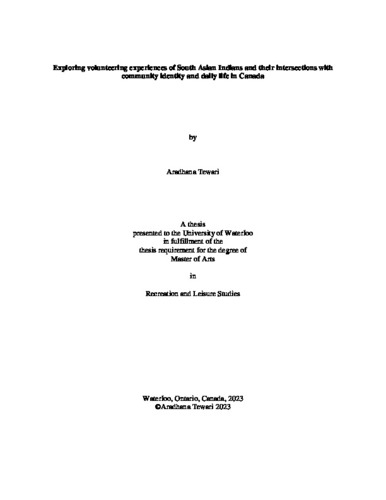| dc.description.abstract | There is abundant evidence that volunteering generates both positive and negative
impacts on the daily lives of volunteers as well as individuals in the communities they serve
(Cavanaugh et al., 2000; Han et al., 2020, p.1732). Volunteering experiences of immigrant
communities like South Asian Indians (SAIs) in Canada are not well represented in Western
volunteering literature, and this gap is especially concerning in times when there is a worldwide
decline in volunteering retention (Stefanick et al., 2020, p.124). To help fill this gap, I
interviewed SAIs in Canada to understand what it means to volunteer for them and what
constitutes their volunteering experiences. Throughout the research, I became increasingly aware
of the importance of a variety of contextual factors that shaped the volunteering experience.
Adopting a hermeneutic phenomenological approach, I was able to explore the ways in which
different contextual factors influenced the volunteering interpretations, motivations, recognition
of the SAI community identity, as well as the impact that volunteering created on daily life. The
shared conversations with the SAI volunteers revealed four principal themes: (1) volunteering
interpretations are different in the native and immigrant country, (2) settlement goals and leisure
goals are primary volunteer motives, (3) the SAI community identity emerges when volunteers
seek familiarity in the Canadian contexts, and (4) volunteering meanings, motives, and identities
interact to have a possible impact on daily life. The findings highlight the interactions between
the contexts, volunteers’ priorities, leisure outcomes of volunteering, and culture at the
volunteering organization, thereby reinforcing the significance of considering the contextual
factors in future research. In addition, the study presents volunteer participants’ suggestions that
can support volunteering organizations in their work to improve volunteer welfare and volunteer
retention. | en |

